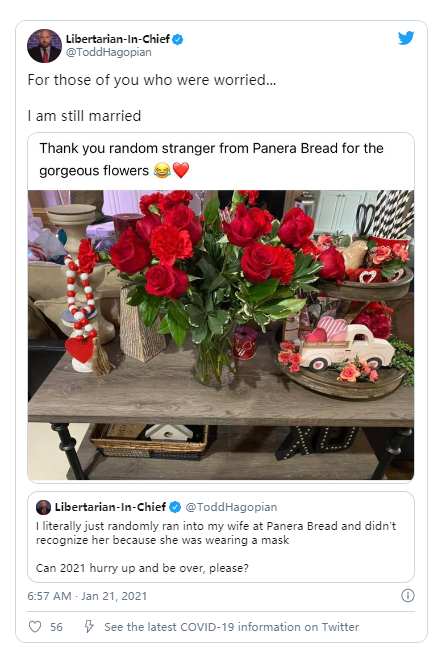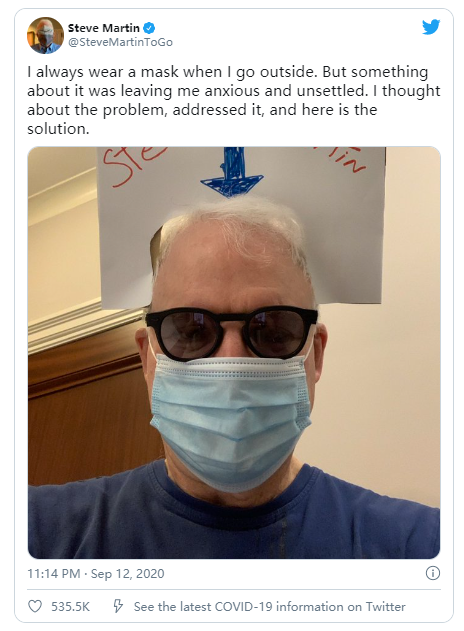
 i_need_contribute
i_need_contribute
Hagopian, 40 and a business owner in Bixby, Okla., had just left home on a Wednesday morning in January when a colleague called him about a situation at the office. Rather than waiting to deal with it once he arrived, he pulled his car into the nearest Panera parking lot and grabbed a table inside. As he spoke on the phone in what he described as a loud, “not so happy” voice, a woman peered at him from around the corner.
“I gave her a look like, ‘What are you looking at? I’m in the middle of a work call.’ Then I just gave her a nod,” Hagopian said, “like you’d give to any stranger who you made eye contact with.” The woman walked away to pick up her food, then glanced over again.
As soon as he hung up, the same woman approached Hagopian’s table. She removed her mask and Hagopian found himself face-to-face with Andrea, his wife of 10 years and the mother of his four sons.
he had just said goodbye to him at home an hour earlier. “Did you just nod at me?” she asked him.
In his defense, his wife was not someone Hagopian expected to bump into on this particular morning at this particular Panera. “I’m usually at work by then, and I didn’t know that that was part of her morning routine,” Hagopian said.
He followed his wife out to her car to make sure she wasn’t upset. Much to his relief, she wasn’t; by the time they got in their separate cars, the two were laughing about it. But just to be sure, Hagopian later sent his wife a bouquet. She posted a photo to Facebook with the caption, “Thank you random stranger from Panera Bread for the gorgeous flowers.”

Ever since we were told to wear masks 11 months ago, our social life has been adjusting. When dining out, we’ve learned when to put them on (when the server approaches) and when they can come off (during the eating portion, assuming we want to actually ingest our meals). We’ve learned to nudge, elbow or kick our partners when we want to discreetly grab their attention, rather than silently mouthing words.
But some of us are still having trouble placing a familiar face, winding up in the surreal, often embarrassing predicaments of having failed to recognize colleagues, friends, neighbors and even members of our own family. In the age of social distancing, it certainly hasn’t made anyone feel less alienated from other people.
In Washington, new colleagues within the Biden administration keep awkwardly reintroducing themselves to one another as they try to get acquainted while masked, the New York Times reported. Senate Majority Leader Charles E. Schumer (D-N.Y.) recently ran into Alex Moffat, the actor who plays him on “Saturday Night Live” — and needed a moment to recognize him behind his mask. Meanwhile, Steve Martin has joked that he’s not sure he’s comfortable with so much anonymity, and has begun wearing a sign with his name on it.

Tiffany Graves, a 45-year-old lawyer from Ridgeland, Miss., was out running errands recently when she was greeted by name by a stranger. Graves found herself responding with a wary, noncommittal “Hey.” After a moment, the stranger realized what was happening and pulled down his mask to reveal his face.
“As an attorney, you always want to know your judges,” Graves said. “Not only is he a federal judge, but he’s, like, a good friend. Someone who I really look up to and admire. I was mortified.”
T. Greg Doucette, a criminal defense attorney in Durham, N.C., had his own misadventure in covid-era lawyering when he introduced himself earlier this month to someone he’d just met at the local courthouse. The young man then pointed out that Doucette, 39, had interacted with him on several occasions in a mentorship capacity at his law school before the man graduated in spring 2020.
“I tried to cover it up,” Doucette admitted. “But it was embarrassing. I’ve sat and talked with this guy, and couldn’t recognize him.”
Certainly, these gaffes could happen to anyone who’s proverbially “bad with faces,” even ones without masks. What happened to Clarke Betz, however, is a different story. The 21-year-old shop owner and model from Manhattan Beach, Calif., recently traveled to Washington to visit her long-distance boyfriend. She didn’t tell him what time her flight was getting in, in hopes she could surprise him at the deli where he works. It didn’t go as planned. “I walked past him three times. I said, ‘Hi, Henry,’ but he didn’t hear me because of the mask,” Betz said. Eventually, humiliated, she left.
“I just figured he was really busy,” she said. Later, when he met her at her hotel, Betz asked why he hadn’t acknowledged her. He was aghast: He hadn’t known she was there at all. She has since surprised him at work again — with vastly improved results.
And Megan McDonald, a 34-year-old office manager in Las Vegas, recently made local news headlines with her mask mishap. Last summer, McDonald found out she’d won a raffle for a jersey autographed by one of her favorite hockey players, Marc-Andre Fleury of the Vegas Golden Knights. Months later, on Jan. 18, McDonald was watching television at home, and when the doorbell rang and her Ring camera showed a man in a mask, she figured he was a salesman and ignored it. Fifteen minutes later, she got an email from Fleury’s agent. Fleury had come to deliver the jersey himself. He left it in a Whole Foods bag on her doorstep.
“I was like, ‘Wow, does he think I’m a total jerk?’ Because he probably heard someone there,” McDonald recalled. “Hopefully one day I’ll run into him and be like, ‘Hey, remember that time …? Sorry about that.’ ”
Caroline Blais, a psychology professor at Canada’s University of Quebec in Outaouais who has done studies on facial processing, said that humans’ ability to recognize each other varies widely. Some may only need 10 percent of the face — one eye, maybe even just an eyebrow — to be able to place someone. It’s generally easier for people to recognize faces by just the top half than just the bottom half.
“For most people, the eye area provides a lot of information about identity,” she said.
There are ways to fight the nuisance of Involuntary Mask Anonymity. Wear a mask that reveals your company, or your favorite sports team, or your name, like the one Rep. Robin L. Kelly (D-Ill.) recently wore on Capitol Hill. Or one of those screen-printed masks emblazoned with the bottom half of your face (though as Blais admitted, those are “a bit creepy”).
That said, some of us love the anonymity that masks provide — and the plausible deniability of “not recognizing” someone else. Graves is sometimes quietly thrilled to slip past a too-friendly acquaintance in the grocery store. “There are those times when people does recognize you and they want to be really chatty,” she said. Sometimes they take their masks down to be heard more easily and beckon her to take hers off, too. “I’m like, ‘No! I’m in public. I’m not trying to stand around and do this right now!’ ”
But for others, obscured faces are a recurrent source of agitation. Hagopian, the Oklahoman who failed to recognize his wife at Panera, acknowledges that he’s among the many who suffer from mask-induced face blindness. Local food trucks sometimes visit his neighborhood, and when he bumps into a neighbor waiting in line, what would otherwise be a pleasantly surprising encounter often turns into a panicked one. No neighbor has trouble recognizing Hagopian, who’s short and has a distinctive voice. But from his point of view, “Everyone’s 5-9 and White,” he said with a laugh.
The loss of the ability to immediately recognize friends and acquaintances is one of the more minor “tiny violin” tragedies of the coronavirus pandemic. But it can add an extra bit of stress and loneliness to an already stressful, lonely year. “We’re obviously not having as many conversations with people out in the open as we normally would in those types of situations — or any meaningful conversations,” Hagopian said. It’s just one more reason he wants the pandemic to end: “I would say the sooner we can get back to normal, probably, the better.”